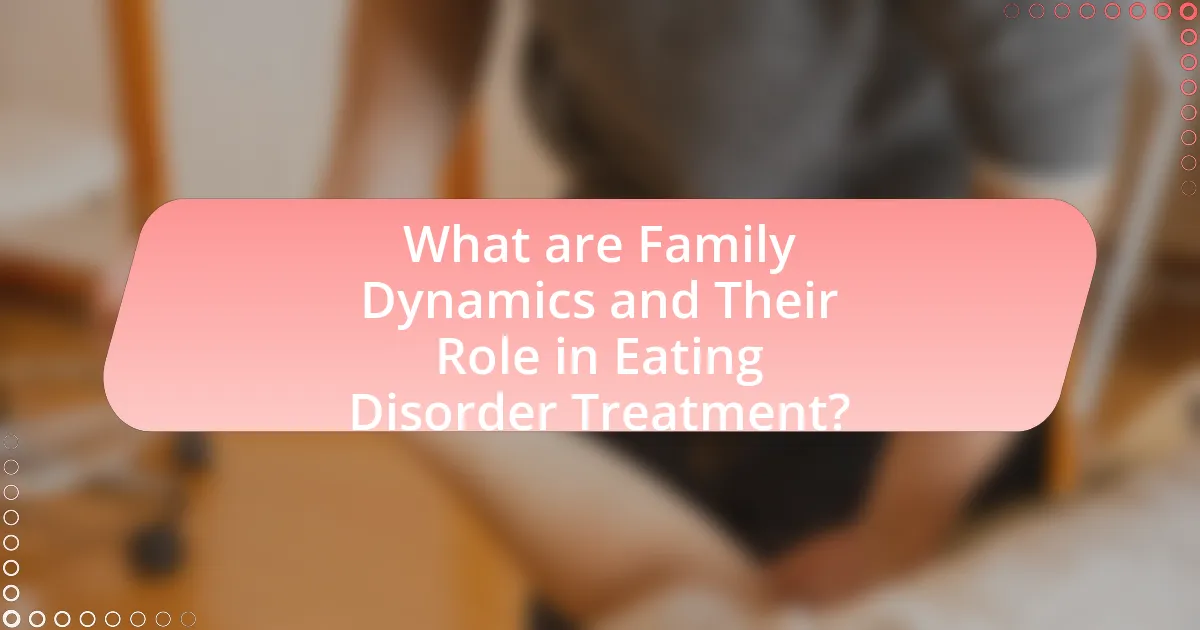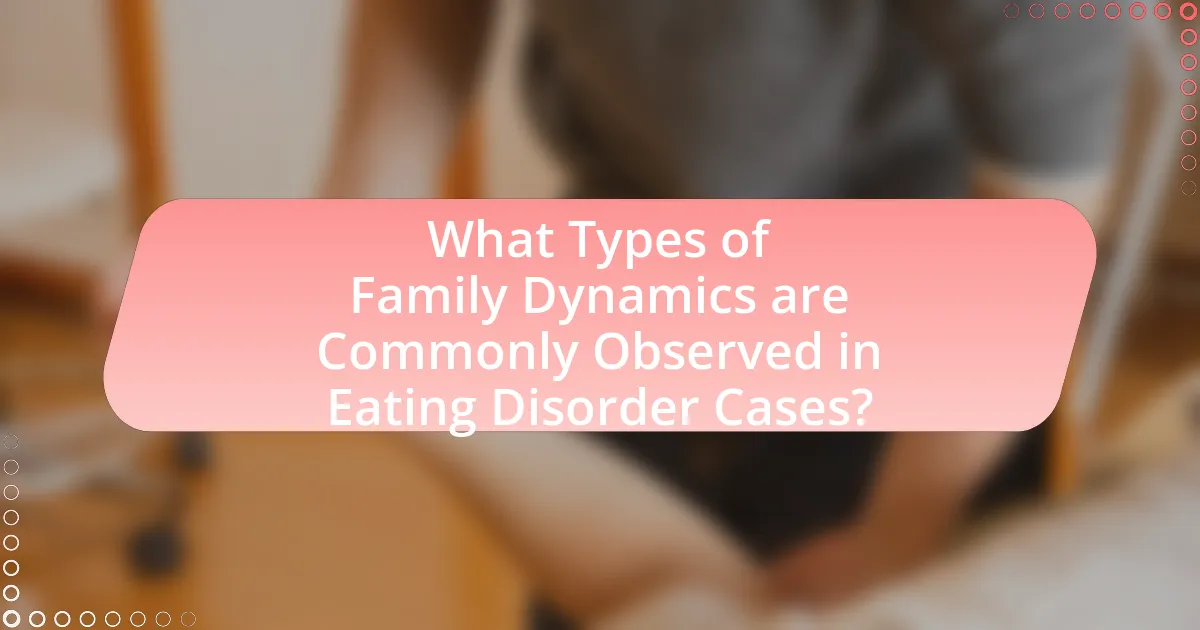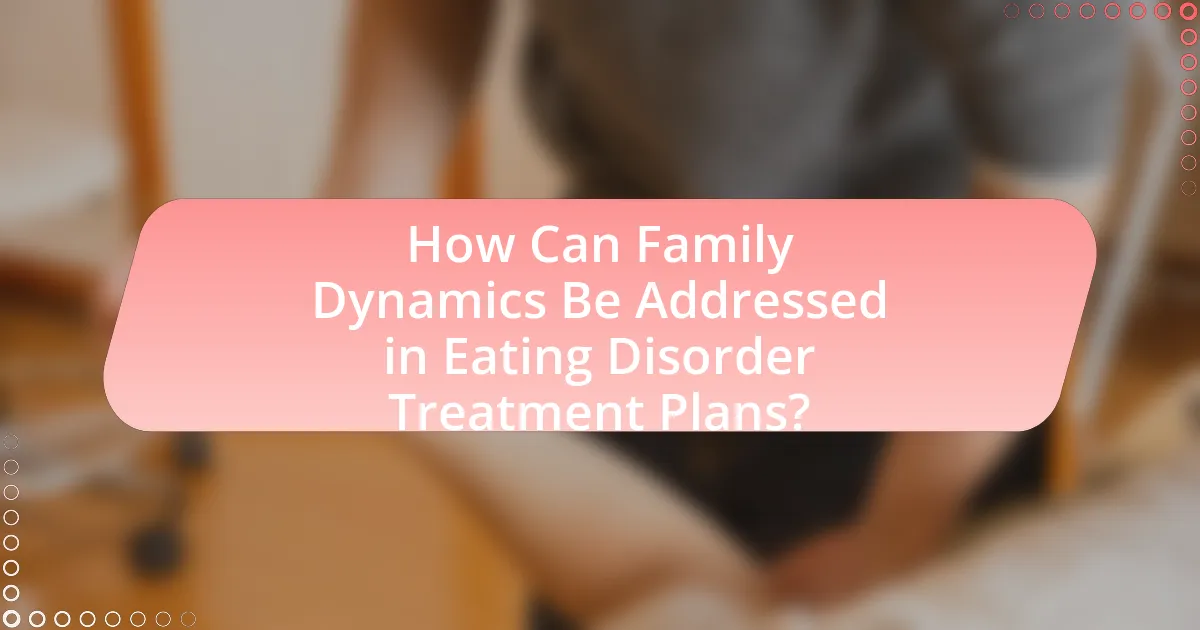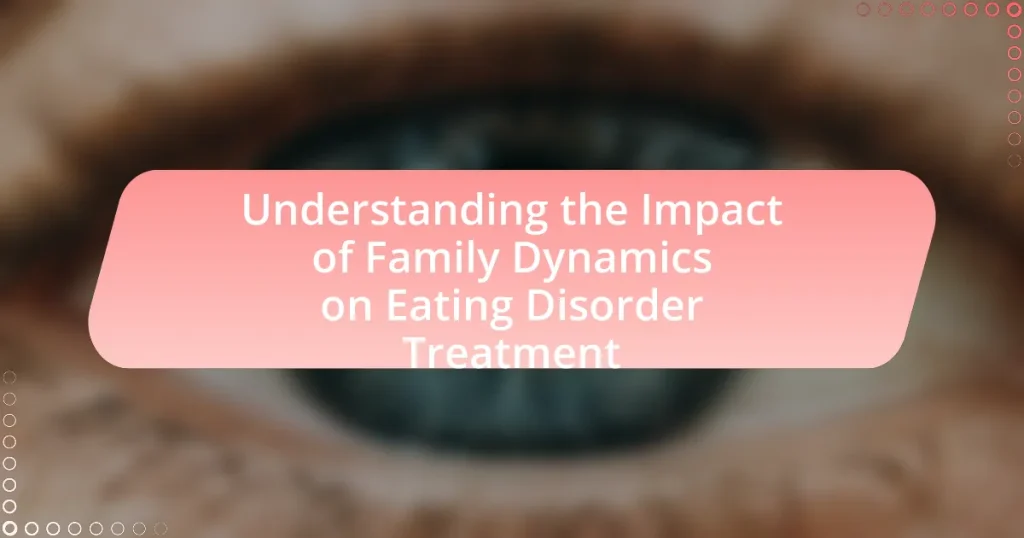Family dynamics play a crucial role in the development and treatment of eating disorders, influencing individual behaviors and mental health. This article examines how family interactions, including communication patterns and emotional support, can either contribute to the onset of eating disorders or facilitate recovery. It highlights the significance of addressing specific family factors, such as parental criticism and enmeshment, in therapeutic settings. Additionally, the article discusses effective treatment approaches, including Family-Based Therapy, and outlines practical steps families can take to support loved ones in recovery, emphasizing the importance of a supportive home environment and open communication.

What are Family Dynamics and Their Role in Eating Disorder Treatment?
Family dynamics refer to the patterns of interaction and relationships among family members, which significantly influence individual behaviors and mental health, including the development and treatment of eating disorders. In eating disorder treatment, understanding family dynamics is crucial because these interactions can either contribute to the onset of the disorder or facilitate recovery. Research indicates that supportive family environments can enhance treatment outcomes, while dysfunctional dynamics may exacerbate the disorder. For instance, a study published in the Journal of Family Psychology found that family involvement in treatment leads to better recovery rates for adolescents with eating disorders, highlighting the importance of addressing family relationships in therapeutic settings.
How do family dynamics influence the development of eating disorders?
Family dynamics significantly influence the development of eating disorders by shaping individuals’ self-esteem, body image, and coping mechanisms. Research indicates that families with high levels of conflict, criticism, or control can contribute to the onset of disordered eating behaviors. For instance, a study published in the Journal of Family Psychology found that adolescents who experience negative family interactions are more likely to develop eating disorders, as these environments can foster feelings of inadequacy and the need for control over food intake. Additionally, parental attitudes towards weight and dieting can directly impact children’s perceptions of their bodies, leading to unhealthy eating patterns.
What specific family factors contribute to the onset of eating disorders?
Specific family factors that contribute to the onset of eating disorders include high levels of parental criticism, overprotectiveness, and a lack of emotional support. Research indicates that children raised in families with critical or controlling parents are more likely to develop disordered eating behaviors. For instance, a study published in the Journal of Abnormal Psychology found that adolescents who perceived their parents as overly critical were at a higher risk for developing anorexia nervosa. Additionally, family dynamics characterized by a lack of open communication and emotional warmth can exacerbate feelings of inadequacy and low self-esteem, further increasing vulnerability to eating disorders.
How do communication patterns within families affect eating behaviors?
Communication patterns within families significantly influence eating behaviors. Families that engage in open, supportive communication tend to promote healthier eating habits among their members, as positive reinforcement and shared meal experiences can encourage balanced diets. Conversely, families characterized by negative communication, such as criticism or conflict during meals, may contribute to unhealthy eating behaviors, including emotional eating or disordered eating patterns. Research indicates that children from families with poor communication are more likely to develop eating disorders, as they may use food as a coping mechanism for stress or emotional distress. For instance, a study published in the Journal of Family Psychology found that family dynamics, including communication styles, are crucial predictors of children’s eating behaviors and attitudes towards food.
Why is understanding family dynamics crucial for effective treatment?
Understanding family dynamics is crucial for effective treatment because family interactions significantly influence an individual’s mental health and recovery process. Research indicates that family support can enhance treatment outcomes for eating disorders, as families often play a pivotal role in the development and maintenance of these conditions. For instance, a study published in the Journal of Family Psychology found that positive family communication and support are associated with lower relapse rates in individuals recovering from eating disorders. Thus, comprehending the complexities of family relationships allows clinicians to tailor interventions that address both individual and familial factors, ultimately leading to more successful treatment outcomes.
What role does family support play in recovery from eating disorders?
Family support plays a crucial role in the recovery from eating disorders by providing emotional, psychological, and practical assistance. Research indicates that individuals with strong family support systems are more likely to engage in treatment and experience positive outcomes. For instance, a study published in the Journal of Eating Disorders found that family involvement in therapy significantly improved recovery rates, highlighting the importance of communication and understanding within the family unit. Additionally, supportive family environments can reduce feelings of isolation and promote healthier behaviors, further aiding in the recovery process.
How can family involvement enhance treatment outcomes?
Family involvement can enhance treatment outcomes by providing emotional support, improving communication, and fostering accountability among patients with eating disorders. Research indicates that when family members actively participate in treatment, patients often experience reduced symptoms and improved recovery rates. A study published in the Journal of Family Psychology found that family-based interventions significantly increased the likelihood of remission in adolescents with anorexia nervosa, demonstrating that family engagement can lead to more effective treatment outcomes.

What Types of Family Dynamics are Commonly Observed in Eating Disorder Cases?
Commonly observed family dynamics in eating disorder cases include enmeshment, overprotectiveness, and high levels of conflict. Enmeshment occurs when family members are overly involved in each other’s lives, leading to a lack of personal boundaries, which can exacerbate the individual’s struggle with autonomy and self-identity. Overprotectiveness often manifests as excessive concern for the individual’s well-being, which can inadvertently reinforce the eating disorder by creating an environment where the individual feels unable to cope independently. High levels of conflict within the family can contribute to stress and emotional turmoil, further complicating the individual’s relationship with food and body image. Research indicates that these dynamics can significantly influence the onset and maintenance of eating disorders, highlighting the importance of addressing family interactions in treatment approaches.
What are the characteristics of enmeshed family systems?
Enmeshed family systems are characterized by a lack of clear boundaries between family members, leading to excessive emotional involvement and dependency. In these systems, individual identities often become blurred, as family members may prioritize the needs and feelings of others over their own. This dynamic can result in difficulties in personal autonomy and decision-making, as members may feel obligated to conform to family expectations. Research indicates that such environments can contribute to the development of eating disorders, as individuals may struggle with self-image and autonomy in the context of familial pressures.
How do enmeshed dynamics impact an individual’s relationship with food?
Enmeshed dynamics significantly distort an individual’s relationship with food by intertwining emotional needs and food-related behaviors. In families with enmeshed dynamics, boundaries are often blurred, leading to individuals using food as a means of expressing love, control, or emotional support. This can result in unhealthy eating patterns, such as emotional eating or restrictive dieting, as individuals may feel pressured to conform to family expectations regarding body image and food choices. Research indicates that enmeshment can contribute to the development of eating disorders, as individuals struggle to separate their self-worth from their eating habits and familial approval.
What strategies can be used to address enmeshment in therapy?
To address enmeshment in therapy, therapists can implement strategies such as establishing clear boundaries, promoting individual autonomy, and enhancing communication skills among family members. Establishing clear boundaries helps family members understand their roles and responsibilities, reducing dependency and fostering healthier relationships. Promoting individual autonomy encourages each member to develop their identity separate from the family unit, which is crucial for personal growth and recovery. Enhancing communication skills allows family members to express their feelings and needs openly, facilitating healthier interactions. Research indicates that these strategies can significantly improve family dynamics and support the treatment of eating disorders, as they help create a more balanced and supportive environment for recovery.
How do disengaged family systems affect eating disorder treatment?
Disengaged family systems negatively impact eating disorder treatment by limiting emotional support and communication, which are crucial for recovery. In such family environments, individuals often feel isolated and unsupported, leading to increased feelings of shame and low self-worth, which can exacerbate eating disorder symptoms. Research indicates that family involvement in treatment correlates with better outcomes; for instance, a study published in the Journal of Family Psychology found that patients with higher family engagement showed significant improvements in recovery rates. Therefore, the lack of engagement in family systems can hinder the effectiveness of treatment interventions for eating disorders.
What are the signs of disengagement in family relationships?
Signs of disengagement in family relationships include lack of communication, emotional distance, and avoidance of shared activities. When family members stop engaging in meaningful conversations, it indicates a breakdown in connection. Emotional distance manifests as reduced expressions of affection or concern, leading to feelings of isolation among family members. Additionally, avoidance of shared activities, such as family meals or outings, further signifies disengagement, as these interactions are crucial for maintaining family bonds. Research shows that these signs can negatively impact the treatment of eating disorders, as supportive family dynamics are essential for recovery.
How can therapists engage disengaged families in the treatment process?
Therapists can engage disengaged families in the treatment process by utilizing a collaborative approach that fosters open communication and builds trust. This involves actively involving family members in goal-setting and treatment planning, which has been shown to enhance their commitment to the process. Research indicates that when therapists facilitate family sessions that focus on understanding each member’s perspective, it can significantly improve family dynamics and treatment outcomes. For instance, a study published in the Journal of Family Psychology found that families who participated in structured therapeutic interventions reported higher levels of engagement and satisfaction with the treatment process.

How Can Family Dynamics Be Addressed in Eating Disorder Treatment Plans?
Family dynamics can be addressed in eating disorder treatment plans through the inclusion of family-based therapy, which actively engages family members in the recovery process. This approach recognizes that family interactions and relationships significantly influence an individual’s eating behaviors and emotional well-being. Research indicates that family-based interventions, such as the Maudsley Approach, have shown effectiveness in treating adolescents with eating disorders by fostering communication, support, and understanding within the family unit. By involving families, treatment plans can help identify and modify dysfunctional patterns that contribute to the disorder, ultimately promoting a healthier environment for recovery.
What therapeutic approaches are effective in involving families in treatment?
Family-based therapy (FBT) is an effective therapeutic approach for involving families in the treatment of eating disorders. FBT emphasizes the role of family members in the recovery process, encouraging them to support the individual struggling with the disorder. Research has shown that FBT leads to significant improvements in weight restoration and reduction of eating disorder symptoms in adolescents, with studies indicating that approximately 75% of adolescents with anorexia nervosa achieve full recovery after undergoing FBT. Additionally, multi-family group therapy (MFGT) is another effective approach, as it allows families to share experiences and strategies, fostering a supportive environment that enhances treatment outcomes. These approaches are validated by clinical studies demonstrating their efficacy in improving family dynamics and promoting recovery in individuals with eating disorders.
How does Family-Based Therapy (FBT) work in treating eating disorders?
Family-Based Therapy (FBT) works in treating eating disorders by actively involving family members in the recovery process, particularly for adolescents. FBT emphasizes the role of the family in supporting the individual with an eating disorder, focusing on restoring healthy eating patterns and weight while empowering parents to take charge of their child’s recovery. Research indicates that FBT has a high success rate, with studies showing that approximately 75% of adolescents with anorexia nervosa achieve full recovery after undergoing this therapy. This approach is grounded in the understanding that family dynamics significantly influence the development and maintenance of eating disorders, making family involvement crucial for effective treatment.
What are the benefits of including family therapy in treatment plans?
Including family therapy in treatment plans enhances support systems, improves communication, and fosters understanding among family members. Research indicates that family involvement can lead to better treatment outcomes, particularly in eating disorders, where family dynamics significantly influence recovery. A study published in the Journal of the American Academy of Child & Adolescent Psychiatry found that adolescents with eating disorders who participated in family therapy showed higher rates of remission compared to those who did not. This underscores the importance of integrating family therapy to address relational factors that contribute to the disorder and to create a collaborative environment for healing.
What practical steps can families take to support a loved one in recovery?
Families can support a loved one in recovery by actively participating in their treatment process, fostering open communication, and creating a supportive environment. Engaging in family therapy can enhance understanding of the loved one’s struggles and promote healthier dynamics. Additionally, families should educate themselves about eating disorders to better empathize with their loved one’s experiences. Research indicates that family involvement significantly improves treatment outcomes, as families that communicate effectively and provide emotional support contribute to a stronger recovery process.
How can families create a supportive home environment for recovery?
Families can create a supportive home environment for recovery by fostering open communication, establishing routines, and promoting healthy behaviors. Open communication allows family members to express feelings and concerns, which is crucial for emotional support during recovery. Establishing routines provides structure, helping individuals feel secure and focused on their recovery goals. Additionally, promoting healthy behaviors, such as preparing nutritious meals together and engaging in physical activities, reinforces positive lifestyle changes. Research indicates that family involvement significantly enhances treatment outcomes for individuals with eating disorders, as supportive family dynamics can lead to improved emotional well-being and adherence to treatment plans.
What communication strategies can families use to foster openness and trust?
Families can foster openness and trust by implementing active listening, encouraging honest dialogue, and practicing empathy. Active listening involves giving full attention to the speaker, which helps family members feel valued and understood. Encouraging honest dialogue means creating a safe space where individuals can express their thoughts and feelings without fear of judgment, which is crucial for building trust. Practicing empathy allows family members to connect emotionally, validating each other’s experiences and feelings. Research indicates that effective communication within families significantly contributes to positive outcomes in treatment for eating disorders, as it enhances emotional support and reduces feelings of isolation among affected individuals.

